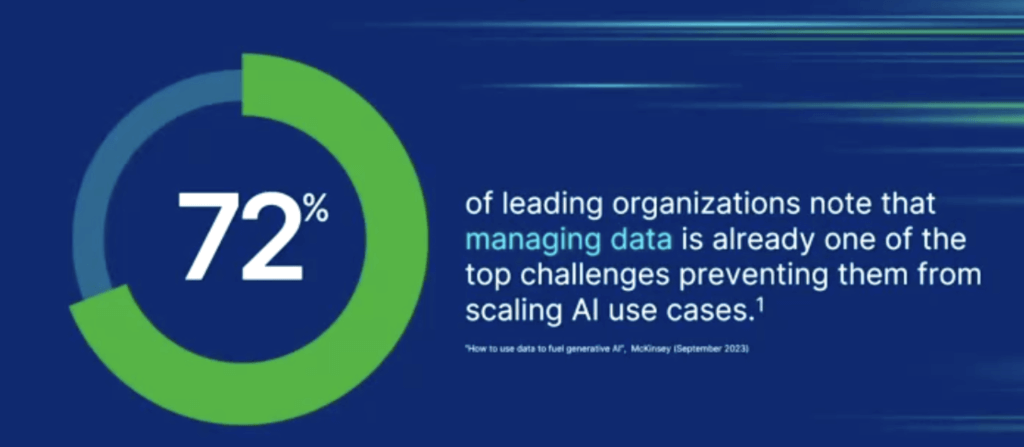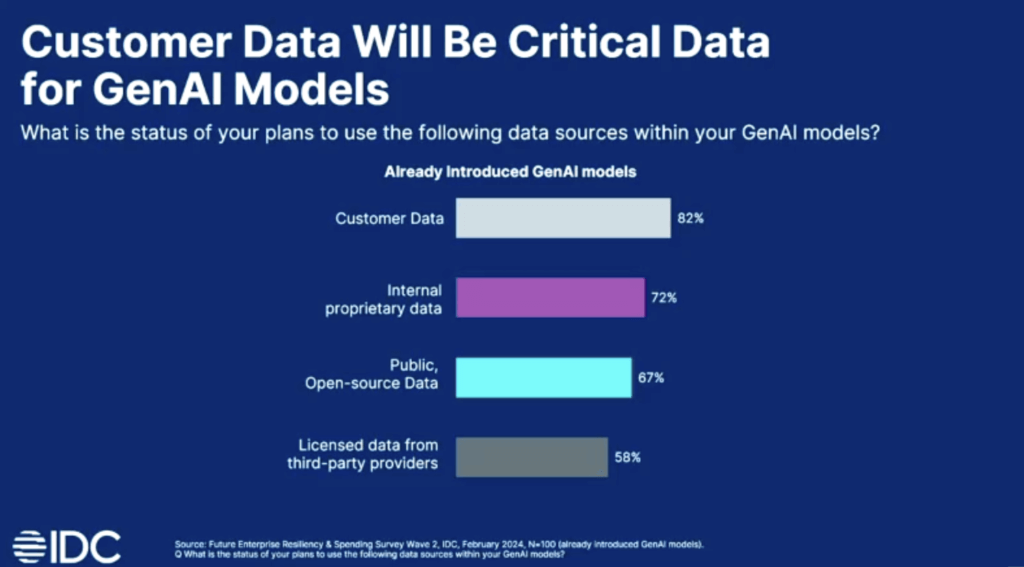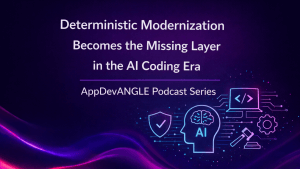As I recap Qlik’s Qlik Connect event held this past week in Orlando, I can’t help but start with Qlik CEO Mike Capone’s comments in his keynote: where there’s data, there’s opportunity. Data is the foundation of everything today, in AI and pretty much everything in between. Today, we are experiencing a new dawn of data and a new era of opportunity. With the rise of artificial intelligence in general and generative AI in particular, we have reached an inflection point that is changing everything all over again — and at the core of that transformation is data.
What I liked most about Capone’s keynote is the fact that he mentioned being a CIO for the vast majority of his career. As he assumed the CEO role at Qlik, Capone shared that he wanted to create the kind of company he wanted to do business with, focusing on business outcomes and working in partnership with customers.
Capone mentioned that so often, the party line we hear ad nauseum is something along the lines of: “You have to move to the cloud right now because it’s good for us (cloud vendors).” Capone shared his feeling that while the cloud is important, not everyone is there yet, and it might take time to get there. So, for the team at Qlik, meeting customers where they are on their individual journeys and prioritizing flexibility and choice is imperative. The team at Qlik is clearly committed to working together alongside customers to figure out the best path for customers and their organizations to the cloud. More importantly, they do that with customers, not to them. Let’s be real: that’s nice to hear for a change.
Watch Mike Capone’s interview on set with theCUBE team during Qlik Connect, where he is joined by Penske’s Sarvant Singh, here:
Qlik Connect Recap: The Opportunity Ahead
The theme of Qlik Connect was very clear: opportunity abounds, and it’s massive. Opportunity to harness analytics, data, and AI; a moment to seize and transform businesses, add value to organizations, and perhaps even opportunities to make the world a better place along the way. How business leaders collectively seize that opportunity and build and leverage solid data foundations will undoubtedly be the ultimate key to success. Data is the key to unlocking new capabilities, utilizing AI for data-driven decision-making at scale, creating sustainable AI value, and using data and AI strategically to accelerate everything we do.
While it’s clear that data plays an outsized role in business success today, it’s not at all easy to get arms around. In fact, according to a study that Qlik partnered with our research partner ETR on in advance of Qlik Connect, a whopping 72% of organizations have indicated that managing data is one of the top challenges that is preventing them from scaling AI use cases.
Better Data Means Better Outcomes, and Data Foundations Play an Outsized Role

Image credit: Qlik/ETR
While harnessing all the data an organization has is an incredibly difficult task, it’s a business imperative. Better data means better outcomes, but it also demands that we put in the time to discover and deploy the right technology. And, while data is important, the need for analytics is also a business imperative.
It’s not hyperbole to say that data has become the literal lifeblood of organizations today. Yet, we all know the phrase “garbage in, garbage out.” This was true a couple of decades ago, and it’s even more true today because, with the advances in generative AI, we have the ability to spit out garbage at an amazing pace. That’s why building the right foundation is critically important. Data quality, or lack thereof, directly relates to an organization’s ability to harness value from AI and analytics. And that’s where Qlik comes in. This 30-year-old company has been laying the foundation for maximizing and harnessing data to drive real-time business insights well before many others were even thinking about it. For CIOs and CDOs who are trying to determine the state of AI value chains and data pipelines and assess their ability to harness and use that data in meaningful ways, it’s no small task. But the reality is that never before have CIOs and CDOs been more important to the organizations they serve, which makes this a very exciting — and admittedly, sometimes terrifying — time. But beyond and despite the challenges, there is much opportunity ahead, and accelerating AI adoption is the key to maximizing that opportunity.
Today’s Business Reality: It’s an AI Everywhere World
Those of us in the tech industry have a front-row seat to seeing how AI is being used to drive productivity and business outcomes. We are experiencing a platform shift where data is rapidly becoming the new platform, and that data-based platform will be the foundation of every organization.
Data will drive business innovation, it will be an input used to train models, and it will also be a business outcome that drives decision-making. The true differentiator and competitive advantage for businesses will be their ability to access and utilize quality data.
IDC’s Meredith Whalen shared the below slide in her discussion at Qlik Connect of the “AI Everywhere” world, which provides a nice glimpse of the many kinds of customer data organizations must harness and manage at scale to recognize productivity gains. That means data infrastructure, data integration capabilities, data storage, data management, and analytics have never been more important than they are today, and the companies who understand this and who can harness the power of data will be well-positioned to win.

Image credit: IDC
Once an organization has arms around harnessing and managing data, it will be able to focus on accelerating AI adoption.
Five Keys to Accelerating AI Adoption
Companies are looking for solutions that enable Gen AI adoption without requiring them to overhaul their existing skill sets and technology stacks. Finding ways to seamlessly integrate AI into current analytics environments and facilitate the extraction of meaningful insights from structured and unstructured data is the path to driving business outcomes, and that’s where the Qlik team’s focus is.
For customers focused on accelerating AI adoption, there are five keys to success. These five keys are:
- Bring all your data together, from any source, and any target (data integration)
- Trust your data (be able to explain where it came from, quality/control, governance, lineage)
- Provide access to complete and trusted data for everybody that needs it (Note: this is not everyone, but rather, everyone who needs access)
- Have a comprehensive set of analytics, as well as AI-powered capabilities. It’s important to note here that you need to be able to do this on both structured and unstructured data (and there’s a whole new level of analytics embedded inside businesses today)
- Take action: figure out what you’re going to do and automate every part of that process possible
Collectively, this is a short, but powerful list. It’s not easy to do — and to get right — but it’s the way organizations need to attack this if they want to get the results they seek.
Rethinking the Principles of Business
As we enter this truly revolutionary time and see AI quickly becoming ubiquitous, changing every facet of human life — the way we live and the way we work — we must rethink the fundamental principles of business as part of this journey.
Nina Schick, a world-leading authority on AI and member of the Qlik AI Council spoke at Qlik Connect on the strategic mindset needed as we enter this new age of AI where we are going to be producing intelligence — and yes, that’s pretty mind-blowing to think about, isn’t it?
There are two key things driving this new industrial evolution: computing power, which is transforming everything, and the data required to power that evolution. I’ve heard the phrase “data is the new oil” more times than I can count in the past few years, and it was no surprise to hear Schick mention that in her keynote. And as we all know, there is no AI without data, and data quality is what matters, not quantity. We, collectively, are the keepers of this new and extremely valuable commodity.
Preparing for this transformation means resetting our collective strategic mindsets and rethinking business principles. One of the insights Schick shared is that she believes it’s essential for every company to build its own sovereign AI, which is about building infrastructure, as well as constructing, codifying, and consolidating data. Why sovereign AI? That’s simple: why would anyone hand over data to anyone else when it’s the veritable lifeblood of a business? Schick believes that all companies of the future will be AI-first companies, and companies who build their own sovereign AI.
Wrapping Up
There were more announcements coming out of Qlik Connect, and I’ll tackle those in a separate post. I will close by saying that Qlik has done a remarkable job of building a data-centric culture and it’s clear that Capone has assembled a team of some of the brightest minds in the business.
One of the things I find most impressive about Qlik is that it’s not just another startup hoping on the AI train and hoping to make inroads. Qlik is a company that has been around, working diligently over the course of a 30-year span to get things right, and it shows. I’m looking forward to continuing to track the progress and inroads Qlik and its customers make in the months to come. As I started this article, where there’s data, there’s opportunity — making the most of those opportunities is where the winners will focus.
Image credit: Marcus Spiske



